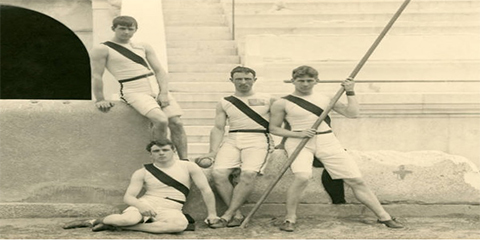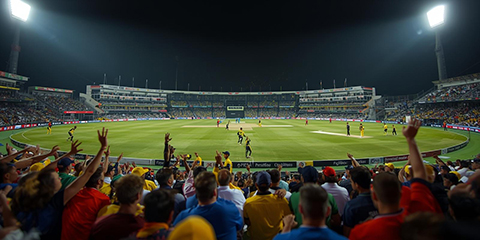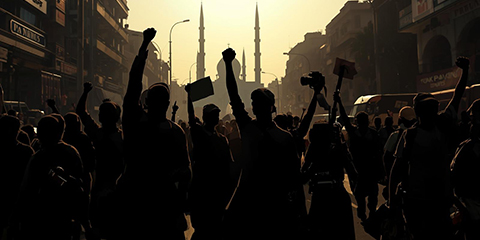The Olympic Games: A timeless testament to human excellence and unity
JournalismPakistan.com | Published 10 months ago | Dr. Nauman Niaz (TI)
Join our WhatsApp channel
The Olympic Games stand as outstanding evidence of the indomitable, resolute, stubborn, and invincible human spirit, representing the ideals of excellence, unity, and the inexorable quest for self-transcendence. Their evolution is deified within the rich cultural and intellectual landscape of ancient Greece, where they excelled in simple athletic competitions to become intense and reflective manifestations of Hellenic philosophical thought. The revival of the Games in 1896 was not just an exhumation of an antiquated ritual but rather an incandescent reaffirmation of values that have long sculpted the edifice of human civilization.
The Ancient Greek Olympic Ethos
The primordial Olympic Games, first described in 776 BCE, were inextricably intertwined with Greek philosophical principles. Held in Olympia, a sanctified precinct consecrated to Zeus, they were instituted upon the cardinal tenets of arete (excellence), kalokagathia (the synthesis of physical and moral virtue), and agon (the noble struggle). To partake in these competitions was not only an exhibition of athletic prowess but a rise toward virtue and self-perfection.
For the Greeks, the sport was the corporeal counterpart to intellectual enlightenment, encapsulated in the adage mens sana in corpore sano (a sound mind in a sound body). This ideal resonated deeply with the philosophies of Plato, who extolled moral excellence, and Aristotle, whose conception of eudaimonia—the highest state of human flourishing—advocated the self-actualization of one's potential through virtuous action. The Games were thus not only a theater of competition but a conduit for the realization of human excellence in its purest form.
The Decline and Dormancy of the Games
As the Greek polis waned and Rome subsumed its cultural patrimony, the Olympics endured, albeit increasingly shorn of their original philosophical grandeur. By the time Emperor Theodosius I proscribed them in 393 CE, deeming them anathema to Christian dogma, they had already devolved into mere spectacles. Their decline was symptomatic of a broader intellectual shift, wherein the classical emphasis on individual excellence conceded to the imperatives of religious orthodoxy and the pragmatic exigencies of imperial governance. The torch of Hellenic humanism, once ablaze, flickered into dormancy.
Pierre de Coubertin and the Philosophical Renaissance
The resurgence of the Olympic Games in the 19th century was championed by Baron Pierre de Coubertin, a French educator, and historian of eccentric vision. His aspiration was not simply to resurrect an ancient institution but to rekindle its foundational philosophical ethos. Overwhelmingly influenced by classical Greek ideals and the British pedagogical emphasis on sport as a place for character formation, Coubertin saw the Olympics as a means of cultivating moral resilience and international amity.
To Coubertin, sport was not just a physical endeavor but a moral and educational instrument of philosophical significance. He envisaged the Olympics as a receptacle for global concord, predicated upon the belief that athletic competition could override parochialism, forge nationalism, and the tumult of conflict. His philosophy, marinated in the humanist ideals of the Enlightenment, championed universalism, fair play, and the holistic development of the individual.
The 1896 Athens Olympics - A Philosophical Proclamation
The first modern Olympic Games, convened in Athens in 1896, were not just a grandiose sporting event but an eloquent philosophical proclamation. They signaled a renaissance of arete and agon, now reframed within a global context. With 14 countries and 241 athletes participating and competing across nine disciplines, the Games rekindled faith in human potential and the immutable connections of mutual respect among nations. They stood as a clarion call to the world: that in the harmonious confluence of mind and body, in the scope of a noble struggle, mankind might once again glimpse the divine spark of its own perfection.
The Renaissance of the Olympic Spirit: A Philosophical Reflection
The modern Olympic Games stand as a manifestation of human aspiration, a witness to the ceaseless quest for excellence, unity, and the transcendence of national and cultural divides. This patrician revival, conceived in the mind of Baron Pierre de Coubertin, was inspired by the ancient Olympic Games, which, from 776 BC to their suppression in 393 AD, had served as a sacrosanct confluence of athleticism and divine reverence. The echoes of Olympia’s past resounded in Coubertin’s vision, compelling him to rekindle the flame of competition and solidarity in a fragmented world.
Charles Pierre Fredy de Coubertin’s Concept of Globalization
It was Coubertin’s ardent wish that Paris, the epicenter of European intellectual and cultural ferment, would host the first modern Olympiad. Yet, in a gesture of homage to antiquity, the honor was bestowed upon Athens, the cradle of Western civilization.
Paris, in deference, was designated to host the Games in 1900, aligning them with the grandeur of the Universal Exposition. In quest of a unifying symbol, Coubertin conceived the five interlaced rings, an eloquent expression of the interconnectedness of the continents, Africa, the Americas, Asia, Europe, and Oceania, bound together by the shared ethos of Olympism.
The Colors of the Olympic Flag
Symbolized within the flag’s colors were the hues of every known nation, an illustrative array of human diversity. The ancient Games, though fostered in a milieu where martial conflicts among city-states were ubiquitous, offered an interlude of peace through the Olympic truce (Ekecheiria). Olympia became a sanctuary where the din of battle conceded to the cheers of the assembled, and athletes traversed hostile lands unmolested, their purpose elevated above parochial strife. Such was the power of sport, to momentarily suspend the discord of men and, in its stead, enshrine a higher, nobler cause.
The Myths That Enrich the Origins
The myths that enveloped the Games’ origins are as compelling as the reality they preceded. The legend of Olympus, in its celestial pageantry, mirrored the very competitions held in mortal showgrounds. Zeus, the supreme arbiter, wrestled his father Kronos for dominion; Apollo, god of light and intellect, outran Hermes and vanquished Ares in pugilism; Heracles, often credited with instituting the Games, triumphed in wrestling and the pankration, a discipline that brooked no constraints. In these divine narratives, one perceives the metaphor of human struggle, the eternal contest between fate and agency, limitation and transcendence.
Yet, as all great civilizations must yield to the inexorable march of time, the Games too succumbed to the changing tides. In 393 AD, the Christian emperor Theodosius I, in his crusade against paganism, decreed the cessation of the Olympic rites. Thus, the sanctity of Olympia was forsaken, its sacred grounds abandoned to the silence of antiquity. But though the physical manifestation of the Games perished, their spirit remained dormant, awaiting a new epoch in which they might once more illuminate the human condition.
That Moment Arrived, Olympics Reincarnated
That moment arrived in 1896. Athens, once more the host, welcomed the world to its storied soil. Fourteen nations answered the call, their athletes converging to reanimate the Olympic ideal. Greece, seeking a symbolic triumph, yearned above all else to claim victory in the marathon, a race imbued with the legend of Pheidippides. Spyridon Louis, a humble water carrier, emerged as the hero of the hour, striding past his rivals to a rapturous ovation from 100,000 spectators.
The Games, however, were not only a contest of strength, but a place of human resilience. Hungarian swimmer Alfréd Hajós, cast into the merciless sea for the 1200-meter race, later confessed that his ‘will to live completely overcame [his] desire to win.’ Here was the Olympic spirit distilled into a cherished moment, the assertion of life’s primacy over mere ambition, the triumph of the indomitable will over adversity.
James Connolly’s Historical Achievement
In this inaugural Olympiad of the modern age, James Connolly, an American, claimed the triple jump title, inscribing his name in history as the first Olympic champion in over fifteen centuries. The echoes of Olympia reverberated once more, carried forth by the strains of the Olympic Anthem, first composed by Spyridon Samaras and Kostis Palamas. Though various melodies would accompany the Games over the years, it was in 1960 that the Samaras-Palamas composition was consecrated as the official anthem, its solemnity befitting the grandeur of the occasion.
The rebirth of the Olympics was marked by ceremonies suffused in tradition and dignity. His Majesty King George I of Greece presided over the Opening, a ritual now enshrined as a staple of every Olympiad. The lighting of the Olympic Flame, an enduring symbol of the unbroken lineage from ancient Greece, was first enacted in 1928 in Amsterdam. The solemn pledges that bound athletes and officials to the ideals of fair play and integrity found their voice in Antwerp (1920) and Munich (1972), respectively.
Olympics: More a Source of Hope
Through the vicissitudes of history, the Olympic Games have persisted as a source of hope, an affirmation of humanity’s capacity to strive, to compete, and to unite. In every athlete’s toil, in every spectator’s fervor, in every anthem’s reverberation, there resides a reminder of Coubertin’s vision, a vision that saw in sport not mere spectacle, but a philosophy, a doctrine of human elevation. Thus, the Games endure, not only as a sequence of events, but as an affirmation of an ideal, one that champions excellence, fellowship, and the uncompromising quest for that which is greater than oneself.
Dr. Nauman Niaz is the Sports Editor at JournalismPakistan.com. He is a civil award winner (Tamagha-i-Imtiaz) in Sports Broadcasting and Journalism and a regular cricket correspondent, covering 54 tours and three ICC World Cups. He has written over 3500 articles, authored 14 books, and is the official historian of Pakistan cricket (Fluctuating Fortunes IV Volumes – 2005). His signature show, Game On Hai, has received the highest ratings and acclaim.
























